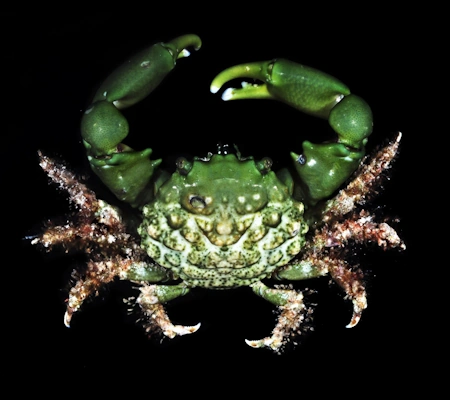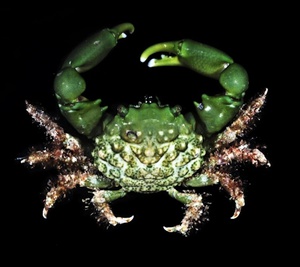he Emerald Crab is well respected for its scavenging ability. It will enthusiastically feed on uneaten meaty foods and many types of nuisance algae. Unlike many other animals, Mithraculus sculptus will eat bubble algae and helps clean your aquarium of these algae. Its distinct, flat shiny green body and hairy legs easily identify the Emerald Crab.
Native to the reefs of the Caribbean, the Emerald Crab is nocturnal and hides in caves and amongst rubble during the day. In the home aquarium, this member of the Majidae family requires a well-established aquarium with plenty of rockwork and hiding places. Once familiar with its surroundings, the Emerald Crab will venture out of hiding during the day to forage on algae.
Care needs to be taken to ensure an ample supply of food is available for the Emerald Crab. Many aquarists supplement the Emerald Crab's diet with dried seaweed and chopped meaty foods, such as shrimp, as well as a quality pellet fish food.
Otherwise, this opportunistic feeder may turn to corals, invertebrates, or small fish for a food source. However, when well fed, most Emerald Crabs are very tolerant of their tankmates and highly compatible in reef environments. Like other invertebrates, the Emerald Crab does not tolerate copper-based medications or fluctuating water parameters.
Product Information
| UPC | Fish283 | Product Type | Marine Invertebrates |
|---|---|---|---|
| Care Level | Easy | Diet | Omnivore |
| Reef Compatible | Reef Safe | Temperament | Semi-aggressive |
| Number of reviews | 0 |
| 0 | |
| 0 | |
| 0 | |
| 0 | |
| 0 |


